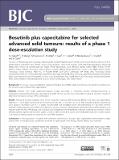| dc.contributor.author | Isakoff, S J | en_US |
| dc.contributor.author | Wang, D | en_US |
| dc.contributor.author | Campone, M | en_US |
| dc.contributor.author | Calles, A | en_US |
| dc.contributor.author | Leip, E | en_US |
| dc.contributor.author | Turnbull, K | en_US |
| dc.contributor.author | Bardy-Bouxin, N | en_US |
| dc.contributor.author | Duvillié, L | en_US |
| dc.contributor.author | Calvo, E | en_US |
| dc.date.accessioned | 2015-01-05T18:27:49Z | |
| dc.date.issued | 2014 | en_US |
| dc.identifier.citation | Isakoff, S J, D Wang, M Campone, A Calles, E Leip, K Turnbull, N Bardy-Bouxin, L Duvillié, and E Calvo. 2014. “Bosutinib plus capecitabine for selected advanced solid tumours: results of a phase 1 dose-escalation study.” British Journal of Cancer 111 (11): 2058-2066. doi:10.1038/bjc.2014.508. http://dx.doi.org/10.1038/bjc.2014.508. | en |
| dc.identifier.issn | 0007-0920 | en |
| dc.identifier.uri | http://nrs.harvard.edu/urn-3:HUL.InstRepos:13581166 | |
| dc.description.abstract | Background: This phase 1 study evaluated the maximum tolerated dose (MTD), safety, and efficacy of bosutinib (competitive Src/Abl tyrosine kinase inhibitor) plus capecitabine. Methods: Patients with locally advanced/metastatic breast, pancreatic, or colorectal cancers; cholangiocarcinoma; or glioblastoma received bosutinib plus capecitabine at eight of nine possible dose combinations using an ‘up-down' design to determine the toxicity contour of the combination. Results: Among 32 enrolled patients, none of the 9 patients receiving MTD (bosutinib 300 mg once daily plus capecitabine 1000 mg m−2 twice daily) experienced dose-limiting toxicities (DLTs). Overall, 2 out of 31 (6%) evaluable patients experienced DLTs (grade 3 neurologic pain (n=1); grade 3 pruritus/rash and increased alanine aminotransferase (n=1)). Most common treatment-related adverse events (AEs) were diarrhoea, nausea, vomiting, palmar-plantar erythrodysesthesia (PPE), fatigue; most frequent grade 3/4 AEs: PPE, fatigue, and increased alanine/aspartate aminotransferase. Although diarrhoea was common, 91% of affected patients experienced maximum grade 1/2 events that resolved. Best overall confirmed partial response or stable disease >24 weeks (all tumour types) was observed in 6 and 13% of patients. Conclusions: In this population of patients with advanced solid tumours, bosutinib plus capecitabine demonstrated a safety profile similar to that previously reported for bosutinib or capecitabine monotherapy; limited efficacy was observed. | en |
| dc.language.iso | en_US | en |
| dc.publisher | Nature Publishing Group | en |
| dc.relation.isversionof | doi:10.1038/bjc.2014.508 | en |
| dc.relation.hasversion | http://www.ncbi.nlm.nih.gov/pmc/articles/PMC4260032/pdf/ | en |
| dash.license | LAA | en_US |
| dc.subject | bosutinib | en |
| dc.subject | capecitabine | en |
| dc.subject | neoplasms | en |
| dc.subject | metastatic cancer | en |
| dc.subject | phase 1 | en |
| dc.subject | safety | en |
| dc.title | Bosutinib plus capecitabine for selected advanced solid tumours: results of a phase 1 dose-escalation study | en |
| dc.type | Journal Article | en_US |
| dc.description.version | Version of Record | en |
| dc.relation.journal | British Journal of Cancer | en |
| dc.date.available | 2015-01-05T18:27:49Z | |
| dc.identifier.doi | 10.1038/bjc.2014.508 | * |


